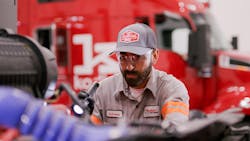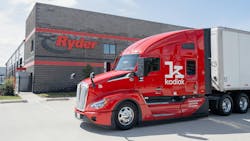Kodiak launches next autonomous truckport at Ryder facility in Texas
Kodiak Robotics and Ryder have been running freight out of an autonomous truckport in Houston since December, the two companies announced on Jan. 23. Located at an existing Ryder fleet maintenance facility, self-driving trucks can “launch and land” at the truckport, which serves freight routes running from Houston to Dallas and Oklahoma City.
This partnership looks to strengthen Kodiak’s fleet operation offerings. The AV company plans to begin driver-out operations in Texas later this year and has partnered with major FleetOwner 500 carriers such as Werner Enterprises and C.R. England. “We know that we can’t just build the technology and drop it over the fence,” Andreas Wendel, Kodiak’s chief technology officer, told FleetOwner earlier this month. “We need to bring them along. And that’s what we’ve done from the beginning through our partner deployment program.”
See also: The future is almost here for latest truck technology
Last year, Kodiak partnered with Pilot Travel Centers to open an autonomous truckport near Atlanta. Kodiak trucks currently operate with safety drivers on all routes, including the Houston-Dallas and Houston-Oklahoma City lanes. The autonomous trucking company plans to begin its first humanless operations along its Dallas-Houston route later this year, using the Ryder facility as a launch point.
“Ryder’s industry-leading fleet services and vast footprint of service locations makes it an ideal partner as we scale autonomous trucks,” said Don Burnette, founder and CEO of Kodiak. “Expanding our network of truckports with Ryder will enable us to operate autonomous trucks at scale with our customers.
Initially, the companies will focus on setting up the Houston truckport, but they want to capitalize on Ryder's fleet service network. This collaboration could grow to support more truckport operations that provide on-site maintenance and technician services.
“Ryder’s vision is to build out a portfolio of key service elements that support the safe deployment and maintenance of autonomous trucks,” said Karen Jones, EVP and head of new product development at Ryder. “By managing the unique logistics of autonomous operations as well as the servicing needs of autonomous trucks, we continue to build on our expertise. And by collaborating with leaders in the space like Kodiak, we advance our shared goal of facilitating the commercialization of autonomous technology.”
The Ryder facility will serve as a base to conduct testing and validate the truckport operational model, Burnette said this week. Kodiak’s autonomous network extends 18,000 miles across the southern U.S. At its truckports, operators can refuel the AV trucks, perform light maintenance, and get pre-trip inspections, including enhanced inspections designed for self-driving trucks.
“Leveraging existing infrastructure eliminates the need for Kodiak to build and develop real estate, and it allows us to focus on launching and scaling driverless truck deployment,” Burnette said.
About the Author
Josh Fisher
Editor-in-Chief
Editor-in-Chief Josh Fisher has been with FleetOwner since 2017. He covers everything from modern fleet management to operational efficiency, artificial intelligence, autonomous trucking, alternative fuels and powertrains, regulations, and emerging transportation technology. Based in Maryland, he writes the Lane Shift Ahead column about the changing North American transportation landscape.


